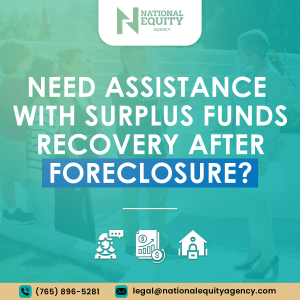
Surplus Funds from Foreclosure Sales: A Lifeline for Homeowners
National Equity Agency (NEA) Specializes in Recovering Surplus Funds for Homeowners
What Are Surplus Funds?
Surplus funds, often referred to simply as “surplus,” are the remaining funds generated from the sale of a foreclosed property when the auction price is higher than the total amount owed on the property. This surplus arises after satisfying all outstanding obligations, including the mortgage balance, taxes, liens, and any foreclosure-related expenses mandated by the court’s final judgment. For example, if a property with a foreclosure judgment of $200,000 sells at auction for $225,000, the surplus funds would be $25,000.
Types of Surplus Funds
Surplus funds can have multiple meanings, including funds remaining after a foreclosure auction or funds left over from a loan or grant:
Foreclosure Surplus Funds
Also known as excess funds or overage, these are the funds remaining after a foreclosed home is sold at auction and all liens and lenders have been paid off. The funds are essentially the remaining equity in the property and are distributed to the former homeowner and lienholders. In Florida, the owner of record on the date the lis pendens was filed is usually entitled to the funds, but an assignee of the owner’s rights may also be able to claim them. To claim the funds, the claimant must submit a claim to the court and trustee, who will then determine if the claimant is owed the funds. The process can be complicated and may involve hearings and motions, so it’s often recommended to seek the help of a lawyer. If the funds aren’t claimed within a certain time frame, they will be kept by the court.
Tax Deed Sale Surplus Funds
If your property is sold in a tax deed sale and the sale proceeds exceed the amount of taxes, interest, penalties, and costs owed, you are entitled to the surplus funds. These surplus funds are typically paid to the former property owner after all the debts and costs associated with the sale have been covered.
Surplus Funds on a Mortgage
Surplus funds are monies due to you following the completion of your remortgage. This occurs when you are borrowing more money from your new lender than you need to pay off your existing lender. Your law firm will arrange with you to send these directly to you on the day of completion. Surplus means extra. You could have a surplus of any material, income, profits, or goods. When it comes to talking about foreclosures and surplus funds, it means the funds that are remaining after all the disbursements required have been paid.
During the foreclosure process, the property is sold to satisfy the mortgage judgment. If the price paid during the sale is more than the amount owed to the mortgage lender, the remaining funds are then referred to as “surplus funds.” For example, if your home was sold for $150,000 but you only owed $120,000, you could be entitled to the extra $30,000. Who couldn’t use an extra $30,000 in their life? Especially after a foreclosure process. It’s certainly worth looking into since as the most recent homeowner you would be entitled to claim it.
Our Mission
Our mission is clear: we are passionate about connecting people with what they’re owed. With a team of seasoned legal experts, we slice through the red tape, deftly navigate the system, and secure your excess proceeds, allowing you to turn the page on this challenging chapter of your life. We firmly believe that you deserve a fresh start, and we are unwavering in our commitment to making it happen.
The Role Of Surplus Funds In Foreclosure Sales
Surplus funds play a pivotal role in the foreclosure process by potentially providing financial relief to former homeowners. These funds are not automatically dispersed; homeowners must proactively claim them through specific legal procedures. NEA specializes in guiding homeowners through this process, ensuring they understand their entitlement and maximizing their recovery.
Who Is Eligible To Claim Surplus Funds?
Typically, the former homeowner of record at the time of foreclosure and any subordinate lienholders, such as second mortgage holders or judgment creditors, are eligible to claim surplus funds.
NEA’s Expertise
Our mission at NEA is to empower homeowners by navigating the complexities of surplus fund recovery on their behalf, utilizing our expertise in legal research and state regulations.
How NEA Assists Homeowners in Recovering Surplus Funds
• Identification: Determine if surplus funds exist from the foreclosure sale.
• Legal Assessment: Understand eligibility criteria and procedural requirements for filing a claim.
• Documentation: Gather necessary documents and evidence to support the claim.
• Filing: Submit the claim within specified timelines and adhere to procedural guidelines.
• Disbursement: Await court approval and the disbursement of surplus funds once all legal obligations are met.
Why Choose NEA For Surplus Fund Recovery?
• Proven Track Record: NEA has successfully recovered surplus funds for numerous clients nationwide.
• Personalized Service: Tailored guidance to meet each client’s unique needs and circumstances.
• Transparent Process: Clear communication and transparency throughout the recovery process ensure homeowners remain informed at every step.
About National Equity Agency (NEA)
National Equity Agency specializes in surplus fund recovery for homeowners across the United States. Founded on principles of integrity and client advocacy, NEA has established itself as a trusted partner in navigating the complexities of surplus funds post-foreclosure. With a commitment to ethical practices and client satisfaction, NEA continues to empower homeowners by securing the financial resources they deserve.
“Our team at NEA is dedicated to providing expert guidance and support throughout the surplus fund recovery process,” said NEA’s legal team. “We take pride in helping homeowners navigate the aftermath of foreclosure and reclaim what is rightfully theirs.”
Becoming a homeowner is a significant milestone, often symbolizing stability and achievement. However, unforeseen circumstances such as job loss or medical emergencies can lead to financial strain, making it challenging to keep up with mortgage payments. In such cases, foreclosure may become a reality, albeit an undesirable one.
Foreclosure can be a daunting process, involving legal complexities and emotional stress. Yet, amidst the challenges, there exists a lesser-known opportunity for homeowners: surplus funds. Understanding what surplus funds are and how they can be reclaimed is crucial for anyone navigating the aftermath of a foreclosure or tax sale.
What Are Surplus Funds?
Surplus funds, also referred to as excess proceeds, are the remaining money from a foreclosure or tax sale after all debts and obligations related to the property have been satisfied. When a property is sold at auction due to foreclosure or tax delinquency, the sale proceeds are meant to cover outstanding debts like the mortgage balance, property taxes, liens, and foreclosure costs. If the final sale price exceeds these debts, the surplus funds are generated.
For instance, if a property has a mortgage debt of $150,000 and sells at auction for $200,000, the surplus funds would amount to $50,000.
How Do Surplus Funds Arise?
Surplus funds arise when the sale price of a foreclosed or tax-delinquent property exceeds the total amount owed to creditors and other lienholders. This can occur due to various factors, including increased property values, competitive bidding at auctions, and the accumulation of penalties and interest on overdue taxes.
The Role of Surplus Funds in Foreclosure Sales
Surplus funds play a pivotal role in the foreclosure process by potentially providing financial relief to former homeowners. These funds are not automatically dispersed; homeowners must proactively claim them through specific legal procedures. NEA specializes in guiding homeowners through this process, ensuring they understand their entitlement and maximizing their recovery.
Who is eligible to claim surplus funds?
Typically, the former homeowner of record at the time of foreclosure and any subordinate lienholders, such as second mortgage holders or judgment creditors, are eligible to claim surplus funds.
Surplus funds from foreclosure sales represent a critical opportunity for homeowners to reclaim some equity after their property is sold. These funds arise when the proceeds from the sale exceed all the debts and expenses required to be paid according to the final foreclosure judgment. National Equity Agency (NEA), a professional surplus recovery company, specializes in guiding individuals and organizations through the complex process of recovering surplus funds from property sales, particularly after foreclosures or tax sales.
What Are Surplus Funds?
Surplus funds, often referred to simply as "surplus," are the remaining funds generated from the sale of a foreclosed property when the auction price is higher than the total amount owed on the property. This surplus arises after satisfying all outstanding obligations, including the mortgage balance, taxes, liens, and any foreclosure-related expenses mandated by the court's final judgment. For example, if a property with a foreclosure judgment of $200,000 sells at auction for $225,000, the surplus funds would be $25,000.
FAQs on Surplus Funds Recovery
Q1: What are surplus funds in foreclosure?
A1: Surplus funds, also known as excess funds or overage, are the remaining funds generated from the sale of a foreclosed property when the auction price is higher than the total amount owed on the property. This surplus arises after satisfying all outstanding obligations, including the mortgage balance, taxes, liens, and any foreclosure-related expenses mandated by the court’s final judgment.
Q2: How can I claim surplus funds from a foreclosure sale?
A2: To claim surplus funds, the former homeowner or eligible lienholder must submit a claim to the court and trustee. This process often involves gathering necessary documentation, meeting specific legal requirements, and potentially attending hearings. It is recommended to seek the help of a lawyer or a professional recovery agency like NEA to navigate the complex process and maximize recovery.
Q3: Who is eligible to claim surplus funds?
A3: Typically, the former homeowner of record at the time of foreclosure and any subordinate lienholders, such as second mortgage holders or judgment creditors, are eligible to claim surplus funds. In Florida, the owner of record on the date the lis pendens was filed is usually entitled to the funds, but an assignee of the owner’s rights may also be able to claim them.
Q4: What happens to surplus funds if they are not claimed?
A4: If surplus funds are not claimed within a specified time frame, they are typically kept by the court. The exact time frame and process can vary by state, so it’s important to act quickly and seek professional assistance if you believe you are entitled to surplus funds.
Q5: Can surplus funds arise from a tax deed sale?
A5: Yes, if your property is sold in a tax deed sale and the sale proceeds exceed the amount of taxes, interest, penalties, and costs owed, you are entitled to the surplus funds. These funds are typically paid to the former property owner after all debts and costs associated with the sale have been covered.
Q6: What are surplus funds on a mortgage?
A6: Surplus funds on a mortgage are monies due to you following the completion of your remortgage. This occurs when you are borrowing more money from your new lender than you need to pay off your existing lender. Your law firm will arrange with you to send these directly to you on the day of completion.
Q7: Why would a foreclosed property sell for more than what is owed on it?
A7: It might seem unusual for a foreclosed property to sell for more than what is owed, especially since many foreclosures are in disrepair. However, property values, particularly in areas like Florida, have increased over the past decade. Additionally, foreclosure properties can be seen as great investments by developers, builders, and real estate flippers, driving up the auction prices.
Q8: What should I do if I think there might be surplus funds from my foreclosure sale?
A8: If you suspect there might be surplus funds from your foreclosure sale, it’s crucial to act quickly. Contact an attorney or a professional surplus recovery agency like NEA to assess your situation, help you determine your eligibility, and guide you through the process of claiming the funds.
Q9: How does NEA help in recovering surplus funds?
A9: NEA assists homeowners by identifying the existence of surplus funds, assessing legal eligibility, gathering necessary documentation, filing claims within specified timelines, and ensuring compliance with procedural guidelines. Our team of seasoned legal experts provides personalized service and transparent communication throughout the recovery process, maximizing the chances of a successful claim.
Q10: What is the process of claiming surplus funds?
A10: Claiming surplus funds involves several steps:
• Identification: Determine if surplus funds exist from the foreclosure sale.
• Legal Assessment: Understand eligibility criteria and procedural requirements for filing a claim.
• Documentation: Gather necessary documents and evidence to support the claim.
• Filing: Submit the claim within specified timelines and adhere to procedural guidelines.
• Disbursement: Await court approval and the disbursement of surplus funds once all legal obligations are met.
Q11: Can subordinate lienholders claim surplus funds?
A11: Yes, subordinate lienholders, such as second mortgage holders, judgment creditors, and associations with unpaid assessments, can file claims against the surplus funds. It’s important for subordinate lienholders to act quickly, as the priority of claims can impact the distribution of surplus funds.
Q12: What should I do if there are competing claims for surplus funds?
A12: If there are competing claims for surplus funds, an evidentiary hearing may be necessary to determine the priority of claims. It’s advisable to seek legal assistance to navigate this process and ensure your claim is properly presented and defended.
Legal Department
National Equity Agency
+ + +1 765-896-5281
legal@nationalequityagency.com
Visit us on social media:
Facebook
LinkedIn
Instagram
Other
EIN Presswire does not exercise editorial control over third-party content provided, uploaded, published, or distributed by users of EIN Presswire. We are a distributor, not a publisher, of 3rd party content. Such content may contain the views, opinions, statements, offers, and other material of the respective users, suppliers, participants, or authors.






